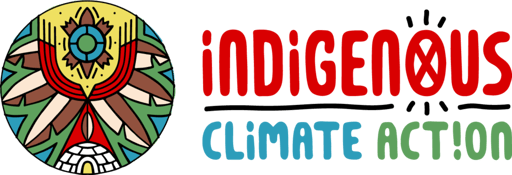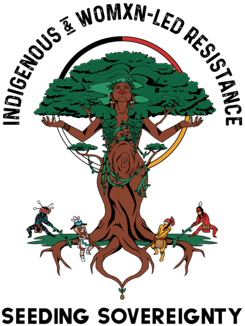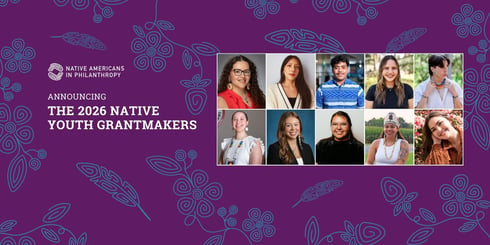Diversify Your Feed: 6 Indigenous Environmental Organizations You Should Follow
Diversify Your Feed: 6 Indigenous Environmental Organizations You Should Follow
At Native Americans in Philanthropy, the majority of our work involves intersectional advocacy. Achieving an equitable and restorative future for Native communities and peoples requires addressing a multitude of interconnected issues.
For Indigenous communities, the conservation of the environment is deeply intertwined with cultural preservation, land and water rights, tribal sovereignty, and the stewardship of ancestral homelands.
In celebration of this year’s Earth Day, here are six Indigenous environmental organizations that should be in your feed!
Honor The Earth
Established in 1993 by Winona LaDuke and Indigo Girls Amy Ray and Emily Saliers, Honor The Earth creates awareness, supports Native environmental issues, and develops needed financial and political resources for the survival of sustainable Native communities.
Honor the Earth develops these resources by using music, the arts, the media, and Indigenous wisdom to ask people to recognize our joint dependency on the Earth and be a voice for those not heard. They are one of the only Native organizations who provide both financial support and organizing support to Native environmental initiatives.
You can follow them on Facebook, Twitter, YouTube, and SoundCloud.
Indigenous Climate Action
Indigenous Climate Action (ICA) is an Indigenous-led organization guided by a diverse group of Indigenous knowledge keepers, water protectors and land defenders from communities and regions across the country.
They believe that Indigenous Peoples’ rights and knowledge systems are critical to developing solutions to the climate crisis and achieving climate justice. ICA works on connecting and supporting Indigenous communities to reinforce their place as leaders driving climate change solutions for today and tomorrow.
By providing communities with knowledge and resources, they aim to inspire a new generation of Indigenous climate leaders building solutions centered around their inherent rights and cultures.
You can follow them on Facebook, Twitter, Instagram, and YouTube.
Indigenous Environmental Network
Established in 1990 within the United States, Indigenous Environmental Network (IEN) was formed by grassroots Indigenous peoples and individuals to address environmental and economic justice issues (EJ).
IEN’s activities include building the capacity of Indigenous communities and tribal governments to develop mechanisms to protect our sacred sites, land, water, air, natural resources, health of all living things, and to build economically sustainable communities. IEN accomplishes this by maintaining an informational clearinghouse, organizing campaigns, direct actions and public awareness, building the capacity of community and tribes to address EJ issues, development of initiatives to impact policy, and building alliances.
You can follow them on Facebook, Twitter, and YouTube.
Kuaʻāina Ulu ʻAuamo (KUA)
KUA is an innovative, community-based initiative for protecting, restoring and caring for Hawaiʻi.
They believe that Hawai’i’s unique native species, ecosystems and island way of life are deeply interconnected, and are at the heart of what makes these islands “home.” KUA supports creative and collective community-based solutions to problems stemming from environmental degradation. KUA advances community-based natural resources management and works together with government agencies and communities towards restoring Hawaiʻi communities’ traditional role as caretakers of their lands and waters.
You can follow them on Facebook and Twitter.
Native Conservancy
The Native Conservancy was established in 2003 to empower Alaska Native peoples to permanently protect and preserve endangered habitats on their ancestral homelands. We strive to maintain and secure titles to Native lands in conservation trusts to strengthen our inherent rights of sovereignty, subsistence and spirituality.
Their vision is to create resilient futures for Indigenous peoples by preserving, repatriating and restoring ancestral homelands, traditional food sources and subsistence practices to revitalize Native culture, habitat, health and spirituality.
You can follow them on Facebook, Twitter, and Instagram.
Seeding Sovereignty
Seeding Sovereignty is an Indigenous-led collective that works to radicalize and disrupt colonized spaces through land, body, and food sovereignty work, community building, and cultural preservation.
By investing in Indigenous folks and communities of the global majority, they believe we will cross the threshold of liberation together.
Their Frontline Fossil Fuel Resistance and the Pipelines to Plastic campaign works to end fossil fuel extraction and expose the connection to plastic production. They support and amplify frontline fossil fuel resistance efforts and connect them to their counterpart communities who receive fracked gas for plastics production in the overburdened Gulf Coast.
You can follow them on Facebook, Twitter, Instagram, and YouTube.
We want to recognize that these are just a few of the many organizations and initiatives working in the environmental and conservation space.
This Earth Day, we want to acknowledge that Indigenous wisdom is so often (if not always) the key to environmental stewardship and the management of natural resources.
Native peoples and communities are repositories of ecological knowledge that is deep-rooted within traditional cultural practices. Environmental conservation requires the inclusion of Indigenous perspectives, and we are encouraged by the increasing visibility that these organizations have achieved and represent.
Happy Earth Day!









Comments